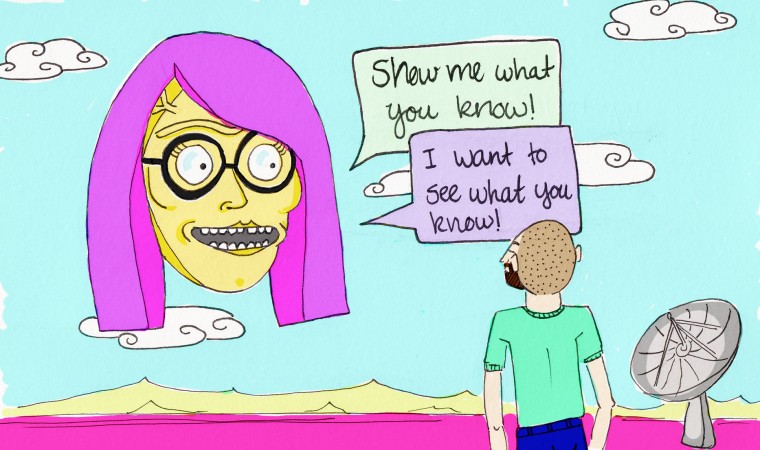
Mrs Artist asks Mr Writer everything she has always wanted to know about writing.
Artist: Is it super personal to have someone read your novel? With art, it’s hard but you have so many pieces it kind of counteracts it. You have so many pieces that if someone doesn’t like one, they might like another. Plus it’s so subjective but writing doesn’t feel as subjective and you usually put more time into it.
Writer: Yes. Holy crap yes. At the start though. It gets a lot easier because no-one succeeds in isolation. People are going to read it eventually (that’s the idea at least) so you kind of just get used to it.
Artist: Does it concern you that people will have their hand in your book if it gets published? Because artists really don’t have to deal with that i.e. editors and proof-readers
Writer: At the start I think everyone is crazy protective about their work. The thing is though, I’ve been back to read the stuff I was once crazy protective about and guess what…it could’ve used a damn editor. As the person making it, you get way too close to have any objectivity. You really need other people to look at it. Ultimately, it’s still your work and you don’t have to change anything.
Artist: What if someone like a publisher wanted you to change an aspect of your book just to make it more saleable? Like just to make it more profitable rather than to make it better? I guess what I’m asking is, is it worth changing something so that people will read it at all or keep it the way it was intended and have no-one read it?
Writer: I guess, in the end, it doesn’t really matter if you’re the best writer in the world if no-one is reading your work. There needs to be a balance between what you’re proud of and what will sell. There’s definitely a point where it could tip into being something you hate and there are plenty of stories of that happening but if you go in thinking that you aren’t going to change anything, best of luck.
Artist: Is it depressing that your fate isn’t really in your own hands? As an artist, I find my own clients and sell my own work. I can’t imagine having to try and sell myself to a person who would then try and sell me to a business who would then sell my work to the public.
Writer: God damn that’s a depressing way to look at it. But I guess that’s why self-publishing is taking off so much. People want control over their own fate and for better or worse, they can have it now.
Artist: But no matter what anyone says, having a publisher publish your book is the goal right?
Writer: For me, yes. For everyone, no idea but I’m betting yes. Most writers don’t write so they can spend the majority of their time being their own agent instead of being out there creating.
Artist: I don’t understand how you can believe in your own characters. You create a character that isn’t real and then you have to almost trust that people will believe they’re a real person. How do you do that? And how quickly do you believe in them? Are they real to you the whole time, do you never think of them as real?
Writer: Honestly, there’s an easy cheat for this that writers have been doing for centuries. Use real people. Take aspects of people you know or have observed and build that into your characters. It’s like how actors follow people around the streets and mimic them to get into a character’s head, except less creepy.
Artist: So, if you’re using people from your own life or using other people’s experiences, what’s the morality of that?
Writer: Everyone will have a different opinion on how far you can take it but my view is, unless you’re taking an incredibly specific experience that could only have happened to that one person, you’re probably not taking anything that hundreds of thousands of people haven’t already experienced. If we’re talking about emotions, reactions etc, using your observations is just getting a window into people’s lives, not ripping them off.
Artist: Do you think this affects your relationships? Does it make you observe people differently?
Writer: I don’t really think it does. Maybe it does for other people but I usually don’t think about it until I’m sitting down to write.
Artist: So you don’t realise you’re picking things up from people until later?
Writer: Definitely.
Artist: When you get feedback from people you trust, how do you know whether to take it on board or not? For example, you could get contradicting feedback.
Writer: Go with what seems right, not what you want to hear.
Artist: And last one, what if there is an over-riding theme to feedback that you just can’t see? Like everyone is saying the same thing but you just can’t see it.
Writer: I can’t imagine how hard that would be but I’d try and get them to show me similar examples from other books or movies etc. It’s a way to try and benchmark their judgements against something you are both objective about. If they’re seeing a theme you don’t see, get them to show you an example of another book with the same theme and see if you see it too.
